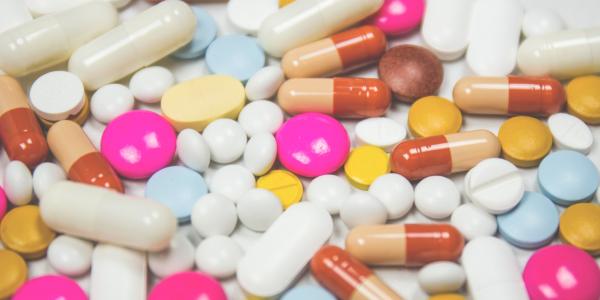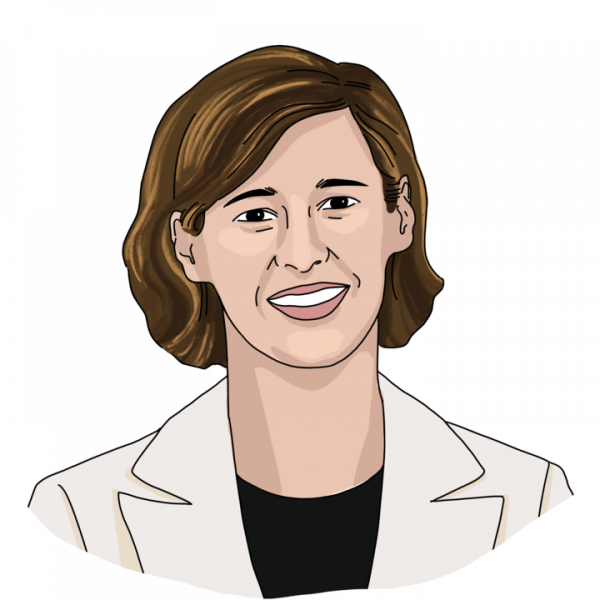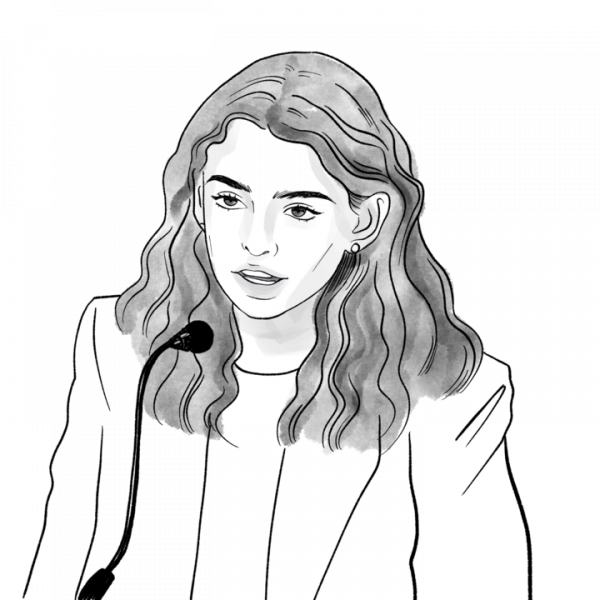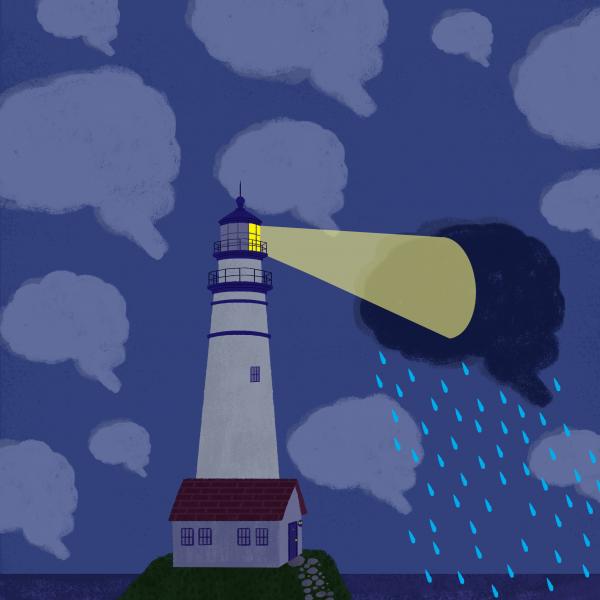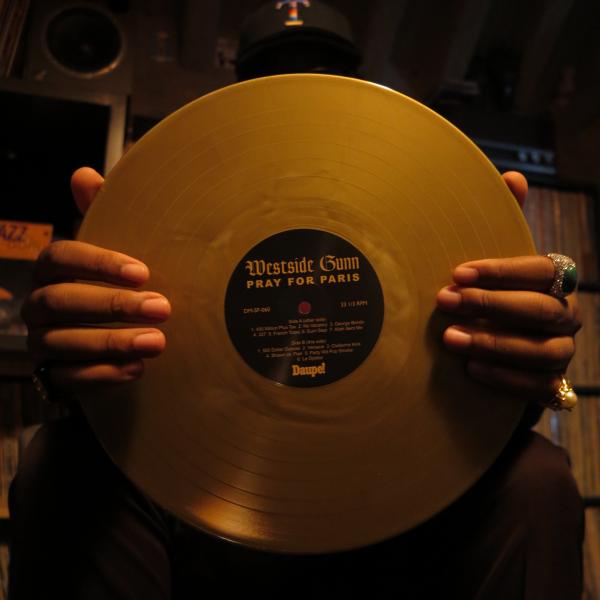Remember the last time you were sick and your doctor gave you antibiotics? What might have happened if those drugs didn't work? As antibiotic-resistant bacteria spread around the world, this scenario is much more than a "what if." The World Health Organization calls antibiotic resistance "one of the biggest threats to global health, food security, and development today." To mark World Antibiotic Awareness Week, chemist Tim Wencewicz explains how we got here, why big pharmaceutical companies are neglecting the problem, and what his lab is doing to solve it.
Transcript:
Claire Navarro (host): Thanks for listening to Hold That Thought. I’m Claire Navarro. This week on the podcast, we’re hearing from Tim Wencewicz.
Timothy Wencewicz(guest): So my name is Timothy Wencewicz. I go by Tim, and I'm an assistant professor in the Department of Chemistry at Washington University in St. Louis.
CN: Wencewicz has been teaching here at WashU for around 3 years, but his love of all things academic goes back much further – in fact back to when he was a kid.
TW: I grew up in southeast Missouri, and my dad was a math professor at Southeast Missouri State University for 43 years. So I sort of grew up playing baseball down there and then sitting in my dad's office pretending to be a professor on the chalkboard.
CN: Like his dad, Wencewicz liked math, but over time he got into chemistry – really into it. In college he started doing demonstrations at local schools, and even some science segments on the TV morning news. But he hadn’t yet found his specialty area. That is, until he met a certain professor.
TW: So there was a really inspirational professor who was a synthetic organic chemist, meaning he makes molecules. But he was making molecules with a purpose, and that purpose was to try to discover new antibiotics.
CN: New antibiotics. Antibiotics, of course, are drugs that fight infections caused by bacteria - tiny, single-celled creatures. Many bacteria live in our gut and help us do things like digest food, but others can cause us to get sick. And as you’ve likely heard, more and more bacteria are becoming resistant to antibiotic drugs. Antibiotic resistance means that illnesses that were once easy to treat can become dangerous. It’s a huge problem – and one that, for reasons we’ll hear about in a minute, big drug companies are not doing very much to solve. So, scientists like Wencewicz and his college professor step in.
TW: So the more chemists you talk to, the more you'll realize we really like a challenge. And for me, the antibiotic resistance phenomenon is a major challenge because a lot of people these days say we're in the post-antibiotic era, that we're actually in the resistance era.
CN: This isn’t some future threat – it’s happening now. According to the CDC, each year in the US 2 million people become infected and 23,000 people die because of bacteria that are resistant to antibiotics. And this is going on around the world.
TW: There's one strain that was an outbreak strain in China that had one single piece of DNA on a mobile element, meaning it could pass it around to its neighbors, that had 45 antibiotic resistance genes on it. So in one simple swoop, one bacteria is resistant to 45 drugs. That's pretty scary. And there are now strains of that bacteria that are resistant to every single FDA-approved drug. So it needs special attention.
CN: So, throughout graduate school and a postdoc position at Harvard Medical School, Wencewicz continued to study the problem and possible solutions. For him, it’s really more than a career path.
TW: I always had a passion to make a difference in the world, as I think many millennials do. And all along the way my passion for that field grew. And I really loved chemistry. But finding a niche for your chemistry in a meaningful area is very important to keep you excited and sort of at the frontier and cutting edge of your field. And that's where I am, here at WashU. I've been here for three years still dedicated to antibiotics, and still come at it with the angle of taking a molecular perspective towards that field.
CN: So why has this field become so necessary and important? How did the “age of resistance” come about? To answer that, we first have to go back a few decades, to when antibiotics first hit the scene.
TW: If you look at the history of antibiotics, they really started back in the late 1930s when the first antibiotics were discovered from the chemical dye industry, the sulfonamides. And from there, that set off a flurry of people just doing what you think of a scientist doing, just looking under a microscope at bacteria and dropping chemicals on them and seeing what happens. It's as basic science as you can get at. And they found a lot of useful things using that method. It turns out for antibiotics, the solution to finding new ones is very basic. It lies in nature. So the soil, plants, microbes, etc., they pretty much have already made any antibiotic we can think of. And so that's what happened in the golden era of antibiotics. In the 1940s to the 1960s, people were digging in the dirt extracting things from plants and then just dropping them on bacteria seeing what they do.
CN: Eventually, this golden era faded. Scientists stopped the search for new antibiotics. A big reason for the shift had to do with attitude, as much as science.
TW: What happens? We're humans and we get cocky and we think we don't need any more antibiotics. We've solved this problem; let's move on. It's the short-term mindset, which was in hindsight a terrible mistake. In 1960, there was a big shift away from that old-fashioned style of digging in the dirt for new drugs, and they switched to these high throughput methods that are more recognizable in big modern pharmaceutical industries that have buildings of millions of compounds that they screen and they figure, "We have everything in here you could ever want." Well, what you don't have are those special molecules that have been evolved over hundreds and millions of years to work very well.
CN: It wasn’t until the year 2000 that a new antibiotic class was brought to the market. Then, there was a breakthrough thanks to a guy named Steve Brickner – a scientist at Pfizer who on his own time found an answer for strep and staph infections that were resistant to penicillin. This was supposed to open a new era of discovery and inspire everybody to get back on track, Wencewicz says. But it didn’t play out that way, and for a pretty depressing reason. Money.
TW: The economics didn't make sense because a patent lifetime for a compound is about 20 years. And by the time you get it to market, you only have 10 years of that left. And if you crunched the numbers and look at where people project the antibiotics now, it's going to take about 25 years before you would make any profit. So you're 5 years out on your patent, and there's no point.
CN: So because antibiotics won’t make big bucks, we all just have to live in a world with superbugs? This is pretty awful, in my mind, but for a little consolation, remember who we’re talking to.
TW: So in comes academics. How can we make a difference? Big pharma has gotten out of the game largely, from the ground up perspective. But if you can come in and find something interesting worth pursuing, you might pique their interest. And I would never sit here and tell you that I'm going to make the next drug. Drug development is a team effort. And it's a large team effort between basic scientists and physicians, company executives, the government – it's huge, and it's too big for any one person to do. But what we can do is take risks and study things from a fundamental perspective that big companies don't have the patience to do because they'll burn too much money doing that, when they have other priority things to pursue. So we can take those risks, find those interesting new discoveries, and then if they have value to them, we can get a company interested.
CN: In the search for these new discoveries, Wencewicz doesn’t have to go all the way back to digging in the dirt like his predecessors – instead, those golden-era scientists are kind of part of the team. Chemists today can build upon what they left behind.
TW: Since 1940, there have been over 25,000 antibiotic molecules reported in the handbook of antibiotics. There are far more molecules out there than that. There's millions. We've just found and characterized 25,000. A very tiny fraction of those 25,000 molecules have even been given a thought for development and use as an antibiotic. So we actually tend to start there.
CN: Now I kind of liked the picture of Wencewicz and his team flipping open some binder filled with a list of tens of thousands of molecules, picking one at random, and from there finding some amazing new drug possibility. But that’s not how this works. These are scientists, after all.
TW: If we're going to go after a molecule, one from nature, our rules are this: the structure has to be different than anything else that's currently being used in the clinic. That's the number one rule if you want to have new activity, you have to have a new chemical structure. So we always start there. And the second part of that is we look at the structure and we read the literature to see if there is anything known about its activity, and we try to pick molecules that do act in new ways. And that gives us a huge advantage because we immediately know we're working on a new structure that acts in a new way, and it's unlikely that it's going to fall victim to the established mechanisms of antibiotic resistance that's in our hospital. And that's where we want to direct our efforts and build more long-term plans, around a molecule that has a future we can manage.
CN: You might think that Wencewicz is looking for molecules that kill bacteria in new ways, totally wipe them out. After all that’s how many current antibiotic drugs work. But, he’s not. The antibiotics that kill a bunch of kinds of bacteria at once are only really needed in certain cases, he says, and they come with a heavy price tag.
TW: If you have a really sick person, maybe they're immune-compromised, they walk into the hospital dying of severe sepsis, severe infection of some kind, you don't know what they have. You don't know why they're sick. So you want to give them a powerful broad-spectrum antibiotic that will just take the place of their immune system and kill the infection outright. That's absolutely needed these days. But if you have a healthy immune system, maybe that's not the best strategy. Because when you kill out all the bacteria, what do you leave behind? Only the resistant ones. And all you need is one cell. And it divides and divides and divides and divides, and then the majority population is resistant. So that's the fear amongst the antibiotic community with pursuing these broad-spectrum, magic-bullet antibiotics. They breed resistance very rapidly.
CN: In fact overuse and misuse of these kinds of drugs is a part of what led to the era of resistance in the first place. Luckily, there are other possibilities. For example…
TW: We're not going to kill the enemy. We're just going to cut it off from its resources. Starve it out.
CN: That’s right. Bacteria need nutrients, just like humans.
TW: When you and I are hungry, we just go to the grocery store, we buy our fruits, vegetables, and meat. To get all of our nutrients, we eat it. We don't even make our own folic acid. We have the bacteria in our bodies make folic acid, or else you can take a supplement, of course. Bacteria have to fight and scratch for every single piece of nutrient, and they have to steal that from us.
CN: Without those nutrients, the bacteria can’t grow and spread. It’s also possible that drugs of the future could target specific bacteria, instead of a whole bunch at once. To be sure, these would not be the right treatment for the super-sick patients that Wencewicz mentioned earlier. Since bacteria aren’t actually killed, a healthy immune system would need to provide backup. There would also have to be improvements in how well and how quickly doctors diagnose infections. Overall, there’s a lot left to discover, but in Wencewicz’s mind, the pay-off would be worth it.
TW: The benefits are huge. When you think about minimizing the exposure of an active ingredient to only one type of bacteria, you'll minimize the side effects that go along with broad-spectrum antibiotics that kill off all your healthy bacteria of your microbiome. So you can preserve the micro biome and only kill out a pathogenic cell. That's the dream antibiotic therapy. And I think someday we'll get there.
CN: That some day may be years away, but in the meantime, Wencewicz stays optimistic and focused on the long-term goal.
TW: I like to compare science to baseball. If you're batting 300, you're doing really well. You're going to make it into the Hall of Fame if you bat over 300. Science is hard, and you have to be willing to deal with failure. You have to acknowledge the people that have paved the way for you to be doing what you're doing. And I think about all the time the mentors I had in my life, particularly my PhD mentor Marv Miller and post-doc mentor Chris Walsh, and I look at them putting in 40-year careers to open the door for someone like me to even be having the thoughts that I'm having. And modern science moves so quickly, and it's so big, that you do follow those directions that have been laid before you. I am very hopeful and excited about every new discovery we have. But I'm also very realistic about how challenging it is, and I think I mentioned earlier that I would never sit here in front of you and say that I personally am going to make the next lifesaving antibiotic. It's a team effort. I could say that collectively, with my students, with the support from an industry partner, with investments from people who are interested in this sort of thing – yes, we could make a lifesaving antibiotic. But that "we" is extremely important.
CN: Thank you to Tim Wencewicz for joining Hold That Thought. You can find many more ideas to explore on our website, holdthatthought.wustl.edu. You can also subscribe to our weekly podcast or find us on Facebook or Twitter. Thanks for listening.
